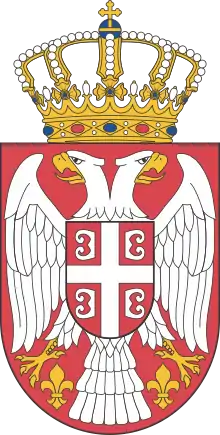Serbians
The term Serbians in English language is a polysemic word, with two distinctive meanings, derived from morphological differences:
Morphology 1: Serb-ian-s, derived from the noun Serb and designating ethnic Serbs, thus having a synonymous ethnonymic use.
Morphology 2: Serbia-an-s, a demonym derived from the noun Serbia, designating the population of Serbia, in general.
In English language, the use of term Serbians depends on the context, with demonymic use being more common, but not exclusive.
Demonymic use
The term Serbians is used in English language as a demonym for all citizens of Serbia, regardless of their ethnic, linguistic, religious or other cultural distinctions. In Serbian, however, the term Srbijanci (Serbian: Србијанци / Srbijanci) is also used for ethnic Serbs from Serbia, or in a narrower sense, Serbs from Central Serbia (Serbia proper).[1] The term thus excludes ethnic Serbs in the neighboring countries, such as Bosnia and Herzegovina, Croatia, Montenegro and North Macedonia, for which the common term Srbin (pl. Srbi) is used. In English, the two are commonly used interchangeably, with the term "Serbians" sometimes applied to ethnic Serbs outside Serbia (such as "Bosnian Serbians" for Bosnian Serbs). Likewise, the term "Serbs" has been erroneously applied to all citizens of Serbia regardless of their ethnicity.[2][3]
The term and usage of Srbijanci is controversial in Serbian-speaking areas. In Croatian usage, Srbijanci are all citizens of Serbia regardless of ethnicity, while Srbi is the term for ethnic Serbs, including Serbs of Croatia. The term itself is mostly used in Croatia and province of Vojvodina.[4][5][6] It has been noted that this type of demonym and distinction between ethnicity and nationality are only found in Bosnia and Herzegovina and Serbia as opposed to other European countries, even other former Yugoslav republics.[lower-alpha 1][7]
In the 1852 Serbian Dictionary, the entry includes the following:
Srbijanac – čovek iz Srbije (man from Serbia); Srbijanski – koji je iz Srbije (which is from Serbia)
A popular Serbian folk song contains a chorus " ...jelek (vest), anterija (short vest), and opanci (traditional moccasins), is how you recognize a Srbijanac (Serbian)...", describing the Serbian folk costume.[8]
Variant terms like Old Serbians (Serbian: Старосрбијанци / Starosrbijanci) and Southern Serbians (Serbian: Јужносрбијанци / Južnosrbijanci) were used as designations for populations from historical regions of Old Serbia, and Vardar Macedonia respectively.[9]
References
- Note, however, that these linguistic distinctions depend on the language used and its way of forming ethnonyms and demonyms. While the two might always be the same in one language, they might be clearly distinct in another. In English, for example, the distinction between ethnonyms Slovenes and Croats as opposed to demonyms "Slovenians" and "Croatians", exists but it is not consistently followed.
- Miller, Nick (2008). The Nonconformists: Culture, Politics, and Nationalism in a Serbian Intellectual Circle, 1944-1991. Central European University Press. p. 148.
- Uzelak, Gordona (1998). "Franjo Tudjman's Nationalist Ideology." East European Quarterly. 31.
- Petrovich, Michael B. (1985). "Review of The National Question in Yugoslavia: Origins, History, Politics." Slavic Review. 4 (2), 369–370
- Nikola Živković. "Vojvodina? Gde je to?" (in Serbian). Nova srpska politička misao. Archived from the original on 2012-05-20. Retrieved 2012-07-08.
Ovim nije kraj naših podela. Pored reč «dođoši», postoji i pojam «prečani» i «Srbijanci». A kako se zovu Hrvati iz Bosne? Hrvatijanci? Ne, ta reč je naravno moja, veštačka, izmišljena. Ali, zasto[ ta pojava postoji samo kod Srba? Srbi i Srbijanci. Austrougarska je izmislila te podele, a mi Srbi smo ih prihvatili. U tome je problem. Mi prihvatamo jezik neprijatelja. Tuđe olako uzimamo, a odričemo se svoga. Tako smo olako odbacili i ćirilicu.
- Nikola Tanasić (2012-07-20). "O Srbima, Srbijancima i srbijančenju Srba" (in Serbian). Nova srpska politička misao. Retrieved 2012-07-08.
O upotrebi pojma „Srbijanac“ [...] Međutim, unutar današnjih granica Srbije, „Srbijanci“ se uglavnom koriste na severu, kako bi se (uglavnom pežorativno i prezrivo) denotirali „gedžovani“, primitivci i sirotinja sa juga koja odudara od „zapadnoevropskih“ manira, običaja i „kulture“ tzv. „Vojvođana“. Očigledno je da ova upotreba, međutim, nastaje kasnije i nema veze sa onim „Srbijancima“ o kojima svedoče Vuk Karadžić i Branko Radičević.
- V., M. (2013-04-25). "Nigde u Evropi ne postoje "Francužani" ili "Hrvaćani", kao što postoje Srbijanci i Bosanci". Blic.
- "Srbin, Srbijanac i Bosanac". B92.
- "Јелек, антерија..." (in Serbian). Srpski kod. 2011.
- Daskalov & Marinov 2013, p. 275, 324.
Literature
- Daskalov, Rumen; Marinov, Tchavdar, eds. (2013). Entangled Histories of the Balkans: Volume One: National Ideologies and Language Policies. BRILL.
External links
![]() The dictionary definition of Serbians at Wiktionary
The dictionary definition of Serbians at Wiktionary
| Wikimedia Commons has media related to People of Serbia. |
- "Serb Or Serbian – Is There A Difference?". Britić. September 14, 2011. (in English)
